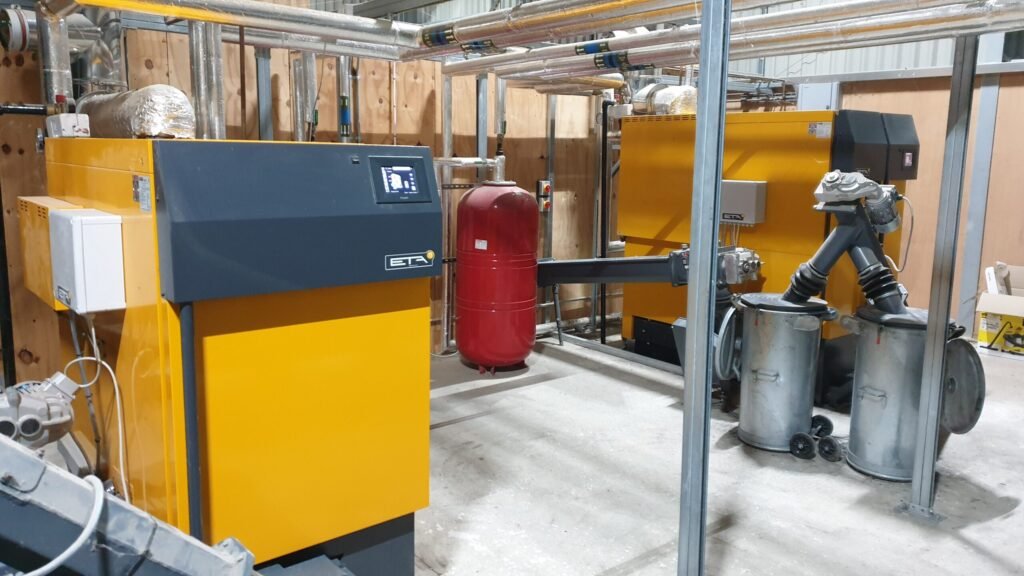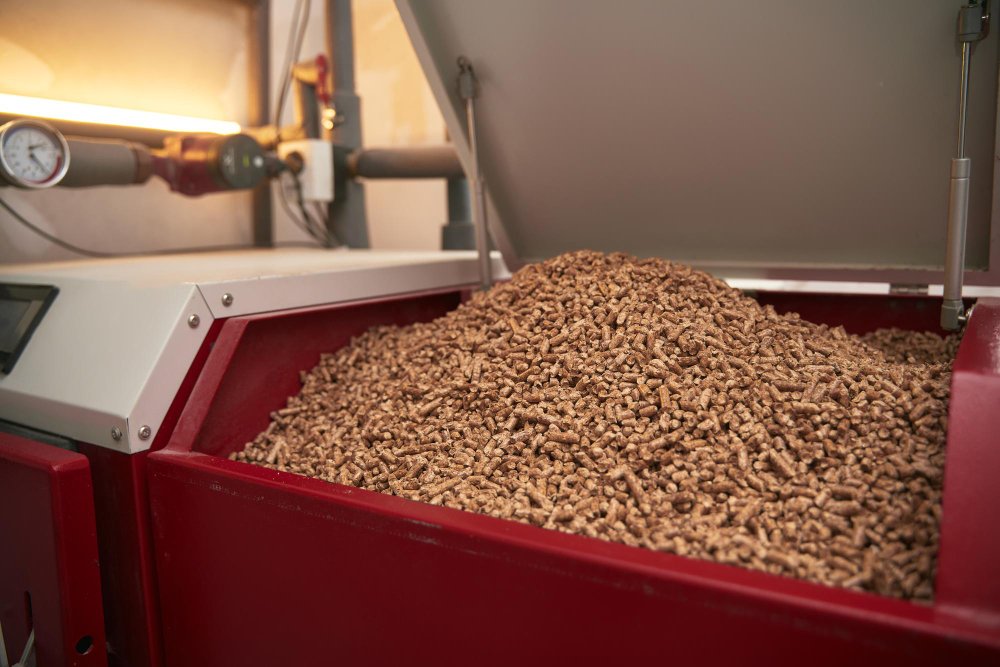The Ultimate Beginner’s Guide to Biomass Boiler Technology
What is a biomass boiler? Biomass boiler technology has been gaining popularity in recent years due to its efficiency and sustainability. It is a great way to reduce your carbon footprint while also providing a reliable source of energy. If you’re considering making the switch to biomass boiler technology, this guide is for you! In it, we’ll cover everything you need to know about biomass boiler technology, from the different types of boilers and their benefits, to the installation process and maintenance tips. We’ll also provide an overview of the different types of biomass fuels available, so you can make an informed decision about which is the best option for you. By the end of this guide, you’ll be well-equipped to make the switch to a biomass boiler system with confidence!

Numer 2 scaled
Benefits of Biomass Boiler Technology
Biomass boiler technology is becoming increasingly popular due to its efficiency and sustainability. Biomass boilers are able to generate heat and electricity using renewable sources of energy, such as wood, agricultural products, and other organic materials. This means that biomass boilers are able to reduce their users’ carbon footprints by up to 90%. Additionally, biomass boilers are able to generate heat and electricity for a fraction of the cost of traditional fuel sources, such as oil and gas.
Biomass boilers also offer a unique form of energy security. Unlike other forms of energy, biomass boilers are able to generate heat and electricity even when the grid is down. This is due to the fact that biomass boilers are able to use stored biomass fuel to generate electricity. This makes them ideal for areas with unreliable electricity supplies, such as rural communities.
Finally, biomass boilers are also incredibly easy to install and maintain. Unlike traditional fuel sources, biomass fuel is easy to source and store, meaning that biomass boilers can be up and running in a matter of days. Additionally, biomass boilers require very little maintenance, as they are designed to be low-maintenance and energy-efficient.
Types of Biomass Boilers
There are several different types of biomass boilers available on the market today. The most common types are wood pellet boilers, log boilers, and chip boilers.
Wood pellet boilers are the most efficient of the three, as they are able to generate the most heat and electricity from the same amount of fuel. They are also the most cost-effective, as wood pellets are widely available and relatively inexpensive. Additionally, wood pellet boilers are incredibly easy to install and maintain.
Log boilers are slightly less efficient than wood pellet boilers, but they are still a great option for those who want to reduce their carbon footprint with biomass technology. Logs are widely available and relatively inexpensive, making them a great option for those on a budget. Log boilers are also easy to install and maintain, making them a great choice for those who want an easy, low-maintenance option.
Finally, chip boilers are the least efficient of the three, but they are still a great option for those who want to reduce their carbon footprint with biomass technology. Chips are widely available and relatively inexpensive, making them a great option for those on a budget. Chip boilers are also easy to install and maintain, making them a great choice for those who want an easy, low-maintenance option.
Choosing the Right Biomass Boiler
When choosing a biomass boiler, there are several factors to consider. The first is the size of the boiler. The size of the boiler will determine how much heat and electricity it is able to generate. It is important to choose a boiler that is the right size for your needs, as an undersized boiler will not generate enough heat and electricity, while an oversized boiler will be inefficient and wasteful.
The second factor to consider is the type of fuel the boiler will use. As mentioned above, there are several different types of biomass fuels available, including wood pellets, logs, and chips. Each type of fuel has its own advantages and disadvantages, so it is important to choose the one that best meets your needs.
The third factor to consider is the efficiency of the boiler. The efficiency of a boiler will determine how much heat and electricity it is able to generate from the same amount of fuel. It is important to choose a boiler that is as efficient as possible, as this will help to reduce your energy costs in the long run.
Finally, it is important to consider the cost of the boiler. Biomass boilers can vary greatly in terms of cost, depending on the size and type of the boiler. It is important to find a boiler that is within your budget, but also one that is of sufficient quality and efficiency.
Installation and Maintenance of Biomass Boilers
Once you have chosen the right biomass boiler for your needs, the next step is to have it installed. The installation process for a biomass boiler is relatively simple, but it is important to make sure that it is done correctly. It is best to hire a professional installer to ensure that the job is done right.
Once the boiler is installed, it is important to make sure that it is properly maintained. This will help to ensure that it is able to run at peak efficiency and that any problems are addressed quickly. Maintenance should include regular cleaning and inspection of the boiler, as well as replacing any worn or damaged parts. Additionally, it is important to keep track of the boiler’s performance, as this will help you to identify any issues quickly.
Finally, it is important to choose the right fuel for your boiler. Different types of biomass fuels have different levels of efficiency, so it is important to choose the one that best meets your needs. Additionally, it is important to store the fuel properly to ensure that it is able to burn efficiently.
Different Types of Biomass Fuels
As mentioned above, there are several different types of biomass fuels available. The most common types are wood pellets, logs, and chips. Wood pellets are made from compressed sawdust and other wood products, and are the most efficient of the three. Logs are slightly less efficient, but are still a great option for those who want to reduce their carbon footprint with biomass technology. Finally, chips are the least efficient of the three, but they are still a great option for those on a budget.
It is important to choose the right type of biomass fuel for your boiler. Different types of fuels have different levels of efficiency, so it is important to choose the one that best meets your needs. Additionally, it is important to store the fuel properly to ensure that it is able to burn efficiently.
Costs and Savings of Biomass Boilers
Biomass boilers are generally more expensive than traditional fuel sources, but they can offer significant savings in the long run. This is due to the fact that biomass boilers are able to generate heat and electricity for a fraction of the cost of traditional fuel sources. Additionally, biomass boilers are able to generate heat and electricity even when the grid is down, meaning they can provide a reliable source of energy even in areas with unreliable electricity supplies.
The cost of the biomass boiler itself will vary depending on the type and size of the boiler. Additionally, the cost of the fuel will vary depending on the type of fuel you choose. It is important to take all of these factors into account when considering the cost of a biomass boiler.
Best Practices for Biomass Boilers
When using a biomass boiler, there are several best practices that should be followed in order to ensure that it is operating at peak efficiency. First, it is important to make sure that the boiler is properly maintained. This includes regular cleaning and inspection of the boiler, as well as replacing any worn or damaged parts. Additionally, it is important to keep track of the boiler’s performance, as this will help you to identify any issues quickly.
Second, it is important to choose the right type of biomass fuel for your boiler. Different types of biomass fuels have different levels of efficiency, so it is important to choose the one that best meets your needs. Additionally, it is important to store the fuel properly to ensure that it is able to burn efficiently.
Finally, it is important to make sure that the boiler is running at the optimal temperature. This will help to ensure that the boiler is able to generate the most heat and electricity from the same amount of fuel. The optimal temperature will vary depending on the type of boiler, so it is important to consult the manufacturer’s instructions.
Tips for Selecting a Biomass Boiler
When selecting a biomass boiler, there are several tips to keep in mind. First, it is important to choose the right size boiler for your needs. The size of the boiler will determine how much heat and electricity it is able to generate. It is important to choose a boiler that is the right size for your needs, as an undersized boiler will not generate enough heat and electricity, while an oversized boiler will be inefficient and wasteful.
Second, it is important to choose a boiler that is as efficient as possible. The efficiency of a boiler will determine how much heat and electricity it is able to generate from the same amount of fuel. It is important to choose a boiler that is as efficient as possible, as this will help to reduce your energy costs in the long run.
Third, it is important to consider the cost of the boiler. Biomass boilers can vary greatly in terms of cost, depending on the size and type of the boiler. It is important to find a boiler that is within your budget, but also one that is of sufficient quality and efficiency.
Finally, it is important to make sure that the boiler is installed correctly. The installation process for a biomass boiler is relatively simple, but it is important to make sure that it is done correctly. It is best to hire a professional installer to ensure that the job is done right.
Conclusion
Biomass boiler technology is a great way to reduce your carbon footprint while also providing a reliable source of energy. It is important to choose the right biomass boiler for your needs, as well as the right type of fuel. Additionally, it is important to make sure that the boiler is installed and maintained correctly in order to ensure that it is running at peak efficiency. By following the tips outlined in this guide, you will be well-equipped to make the switch to a biomass boiler system with confidence!
To get complete information about biomass boilers technology, we would like to invite you to Proadvance from Reading, Berkshire.

